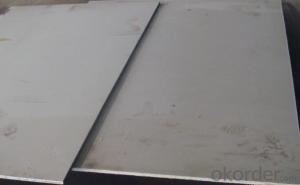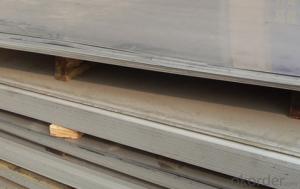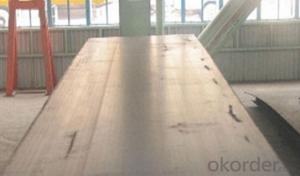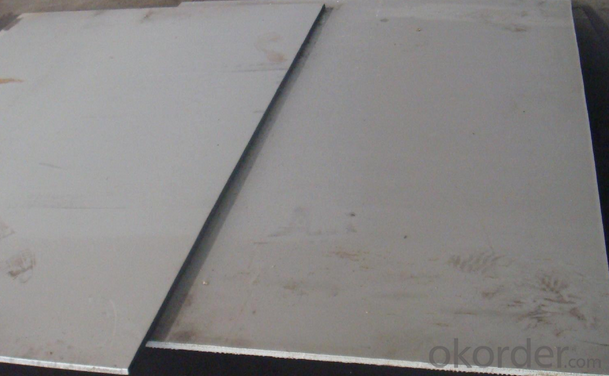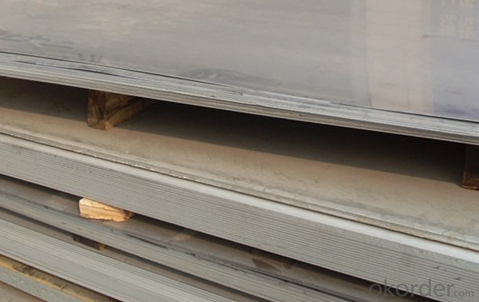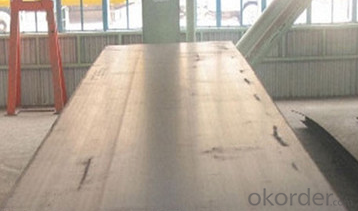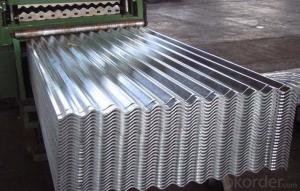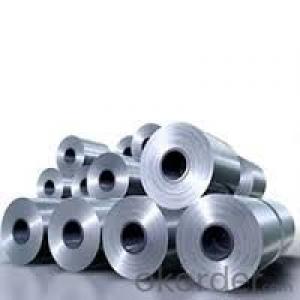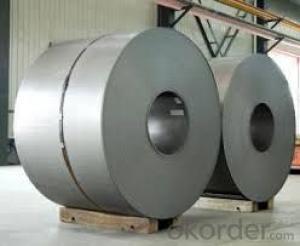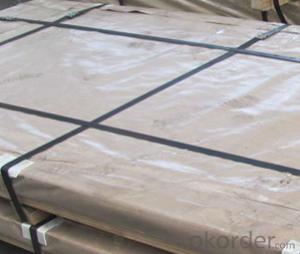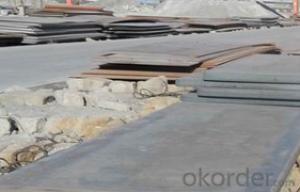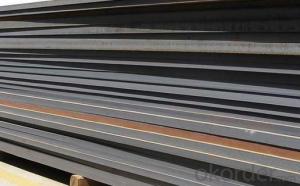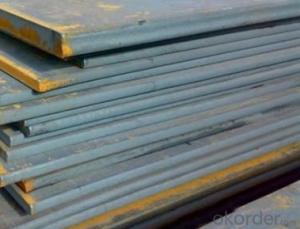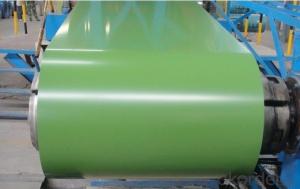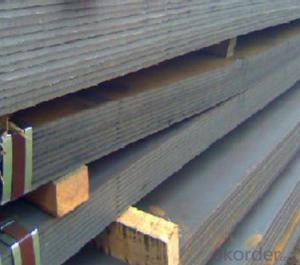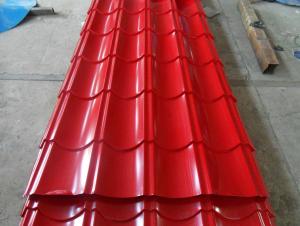Mild Carbon Steel Sheets C45 CNBM
- Loading Port:
- Qingdao
- Payment Terms:
- TT OR LC
- Min Order Qty:
- 10 pc
- Supply Capability:
- 30 pc/month
OKorder Service Pledge
OKorder Financial Service
You Might Also Like
Quick Details
| Grade: | 300 Series | Standard: | JIS, AISI, ASTM, DIN, EN | Length: | 1000-6000 |
| Thickness: | 0.5-100mm | Width: | 1000-2000 | ) | |
| Brand Name: | putan | Model Number: | Q235.Q345 | Type: | Plate |
| Application: | Construction plate,boiler plate,container plate,shipbuilding plate,all | Certification: | BV | type: | plate |
Packaging & Delivery
| Packaging Details: | Export standard package,bundled or be required. The inner size of container is below: 20ft GP: 5.8m(length) x 2.13m(width) x 2.18m(high) 25tons about 24-26CBM 40ft GP: 11.8m(length) x 2.13m(width) x 2.18m(high) 25tons about 54CBM 40ft HG: 11.8m(length) x 2.13m(width) x 2.72m(high) 25tons about 68CBM |
| Delivery Detail: | 7-15 days after receiving the deposit |
Specifications
Q235 Carbon sheet
Original :China
thickness 0.5mm~100mm,
coil steel Processing.
MOQ : 25TON
Carbon Steel plate
Product | SS400 carbon steel plate price |
Standard |
GB/T700-2006,ASTMA283/A283M-03,ASTMA572/A572M,JISG3101-2004,SS400, JIS G3135-1986,SPEC590,EN10025/2-2004,S235JR or S235J2,E335 or S335JR…
|
Width | 500-2000mm |
WT | 0.5 –60mm |
length | 2000—6000mm |
Applications range |
Construction plate,boiler plate,container plate,shipbuilding plate,all kinds of industries and manufacturing structural applications.
|
MOQ | 25 ton / according to customers' requirement |
Quality | good attestation of honour choosed by customers SGS |
Supply capability | 5,000 ton / month |
Key to success | advanced technique and service and low price |
Authentification | ISO9001:2008 |
Market | North/South America, Europe, Asia,Africa,Mid East,ect. |
Packaging |
Standard seaworthy packing / according to the customers’requirement
|
Port | |
Delivery term |
T/T,L/C 30% deposit the balance before shipment,the balance paid by the copy of B/L OR L/C at sight
|
Delivery time | In 15 – 45 days after contract |
- Q: Can the steel sheets be easily cleaned?
- Yes, steel sheets can be easily cleaned.
- Q: How do steel sheets perform in fatigue resistance?
- Steel sheets generally perform well in fatigue resistance. Due to their high strength and durability, steel sheets can withstand repeated cyclic loading without experiencing significant degradation in performance. This makes them suitable for various applications where fatigue resistance is crucial, such as in automotive components, bridges, and structural elements.
- Q: What are the different surface finishes for steel sheets?
- Some of the different surface finishes for steel sheets include mill finish, brushed finish, mirror finish, embossed finish, and galvanized finish.
- Q: How do steel sheets compare to other materials, such as aluminum or copper?
- There are several advantages to using steel sheets instead of materials like aluminum or copper. Firstly, steel is known for its exceptional strength and durability, making it able to withstand heavy loads and resist impacts better than aluminum or copper. This makes steel sheets perfect for applications that require high strength and structural integrity, such as in construction or the automotive industry. Furthermore, steel sheets have a higher melting point than aluminum or copper, meaning they can withstand higher temperatures without deforming or melting. This makes steel sheets suitable for applications that involve exposure to high temperatures, like in manufacturing processes or engine components. Additionally, steel sheets have excellent corrosion resistance properties. They can be coated with protective layers like zinc or chromium to enhance their resistance to rust and corrosion. In contrast, aluminum and copper are more prone to corrosion, especially when exposed to certain environments or chemicals. This makes steel sheets the preferred choice for outdoor applications or structures that need long-term durability. Another advantage of steel sheets is their cost-effectiveness. Steel is relatively cheaper compared to aluminum or copper, especially when considering its strength and durability. This makes steel sheets a more economical choice for various applications where cost is an important factor. However, it is important to note that aluminum and copper also have their own advantages. Aluminum is lightweight and has excellent thermal conductivity, making it suitable for applications that require lightweight materials or efficient heat transfer. Copper, on the other hand, has superior electrical conductivity, making it ideal for electrical wiring or components. In conclusion, steel sheets offer exceptional strength, durability, corrosion resistance, and cost-effectiveness compared to aluminum or copper. However, the choice of material ultimately depends on the specific requirements of the application, such as weight, thermal or electrical conductivity, and environmental factors.
- Q: Can steel sheets be used in the telecommunications industry?
- Indeed, the telecommunications industry can make use of steel sheets. Given their strength, durability, and capability to safeguard delicate equipment, steel sheets find frequent application in various sectors of the telecommunications industry. They are commonly utilized in the production of communication towers, antenna mounts, equipment cabinets, and enclosures. By providing structural support, steel sheets prove resilient against severe weather conditions, including powerful winds, extreme temperatures, and heavy loads. Furthermore, steel sheets can be conveniently fabricated and tailored to meet specific demands, rendering them a favored option within the telecommunications industry.
- Q: What is the difference between a brushed and etched steel sheet?
- Both a brushed steel sheet and an etched steel sheet are types of metal sheets that have undergone different surface treatments, resulting in unique appearances and characteristics. To create a brushed steel sheet, the surface of the steel is brushed with an abrasive material, typically a wire brush or sandpaper. This process produces a textured pattern of fine lines or scratches on the steel surface. The primary purpose of brushing is to enhance the visual appeal of the steel sheet, giving it a satin-like finish. Brushed steel is commonly used in architectural and design applications where a sleek and contemporary look is desired. It is also popular in kitchen appliances and automotive parts due to its resistance to fingerprints and scratches. On the contrary, an etched steel sheet is made through a chemical or acid etching process. This involves applying an acid-resistant material, such as a resist or stencil, onto the steel surface and then exposing it to an acid solution. The acid selectively eats away at the exposed parts of the steel, creating a pattern or design. Etching is employed to achieve intricate and detailed designs on steel sheets, making it a favored choice in industries like signage, jewelry, and art. The etched patterns can range from simple geometric shapes to elaborate images or text. In essence, the main distinction between a brushed and etched steel sheet lies in the technique employed to achieve their respective surface textures. Brushing generates a consistent pattern of fine lines, resulting in a satin-like finish for aesthetic purposes. On the other hand, etching involves a chemical process that creates intricate and detailed designs on the steel surface.
- Q: Are the steel sheets easy to install?
- Indeed, the installation of steel sheets is generally a straightforward task. Their lightweight nature allows for easier handling and maneuverability throughout the installation procedure. Moreover, steel sheets often come equipped with pre-drilled holes or interlocking systems, which further streamlines the installation process. By employing the correct tools and possessing fundamental construction knowledge, individuals can effortlessly mount steel sheets onto diverse surfaces like roofs, walls, or fences. Nevertheless, it remains crucial to adhere to the manufacturer's instructions and safety guidelines to guarantee a correct and secure installation.
- Q: Can steel sheets be cut to custom sizes?
- Yes, steel sheets can be cut to custom sizes.
- Q: How do steel sheets perform in vibration and noise reduction?
- Steel sheets are not particularly effective in vibration and noise reduction. Due to their rigid and dense nature, steel sheets tend to transmit vibrations and noise rather than absorb or dampen them.
- Q: What is the maximum width of a steel sheet?
- The maximum width of a steel sheet may differ due to several factors, including the manufacturing process, equipment capabilities, and industry standards. Typically, steel sheets can be manufactured in widths ranging from a few inches to several feet. Nevertheless, in specific specialized applications, wider steel sheets beyond 100 inches or more might be accessible. To ascertain the maximum width choices available, it is advisable to consult steel manufacturers or suppliers, as it can vary based on the particular necessities and capabilities of the production facility.
Send your message to us
Mild Carbon Steel Sheets C45 CNBM
- Loading Port:
- Qingdao
- Payment Terms:
- TT OR LC
- Min Order Qty:
- 10 pc
- Supply Capability:
- 30 pc/month
OKorder Service Pledge
OKorder Financial Service
Similar products
Hot products
Hot Searches
Related keywords
